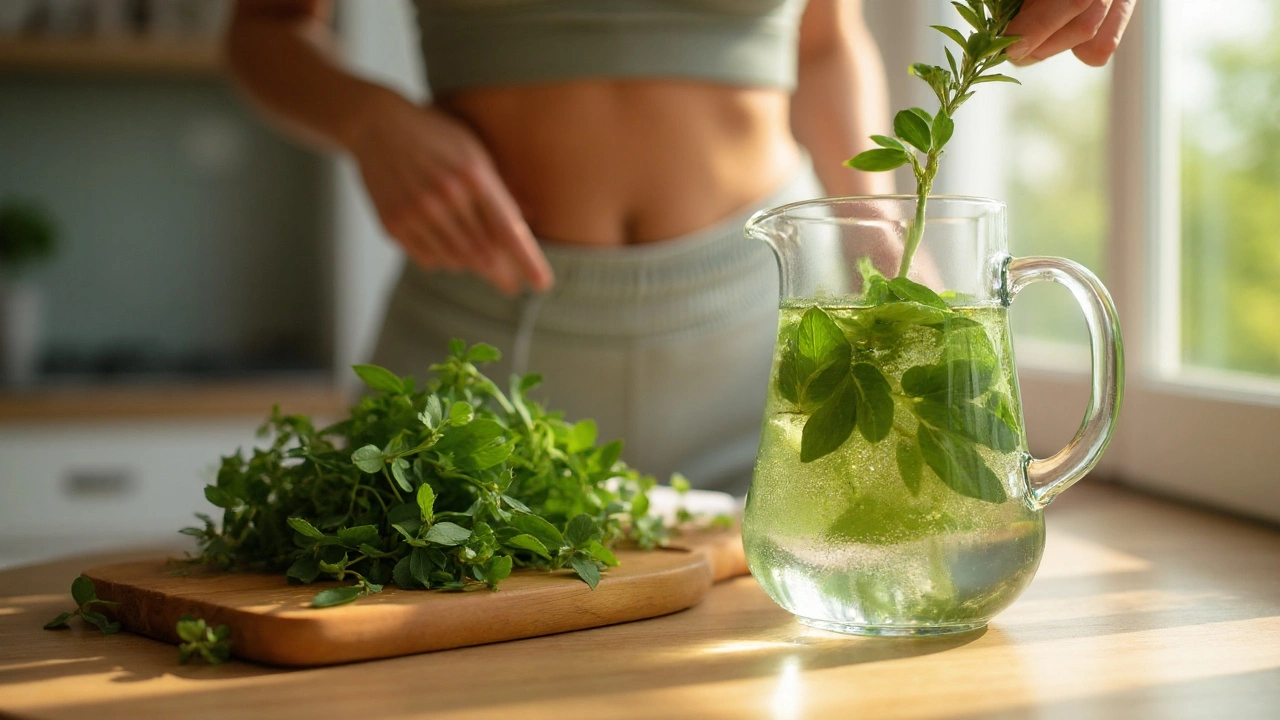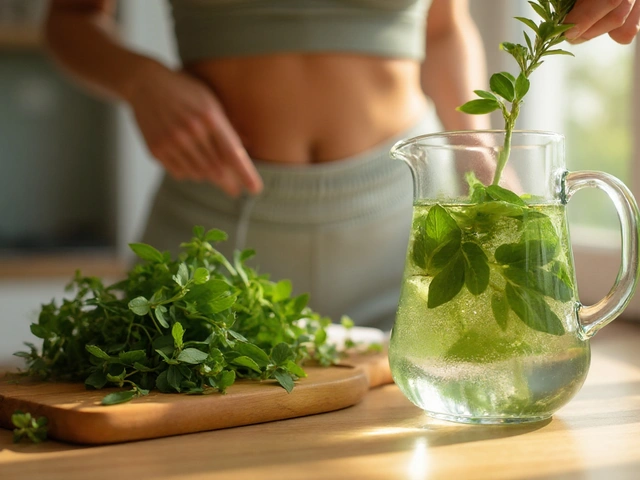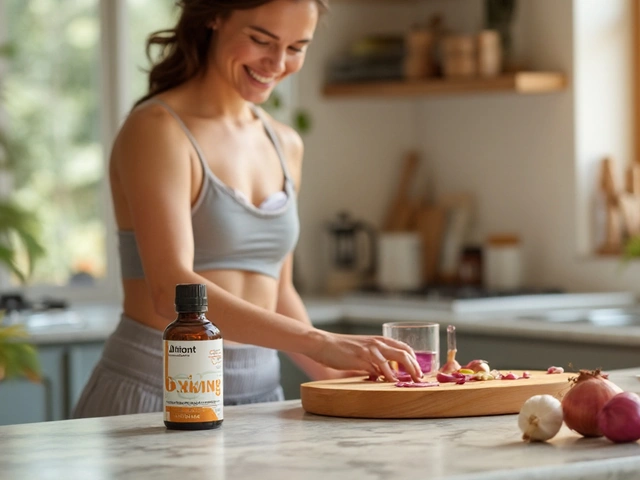Rue is a medicinal herb (Tarragonetum napellus) known for its potent antioxidant and anti‑inflammatory properties. Historically used in Traditional Chinese Medicine and Ayurvedic practices, Rue has resurfaced as a modern dietary supplement aimed at improving heart health, stress resilience, and gut function.
Why Rue is Gaining Momentum as a Supplement
Consumers are craving plant‑based solutions that do more than fill a nutritional gap. Rue delivers a blend of bioactive molecules-especially alkaloids and flavonoids-that act as natural antioxidants, mood stabilizers, and metabolic regulators. Recent surveys from the Dietary Supplement Market show a 23% year‑over‑year growth in sales of herbal extracts, with Rue ranking in the top 10 emerging ingredients.
Key Active Compounds and Their Functions
Understanding what makes Rue work helps you decide if it fits your health goals.
- Alkaloids (e.g., rutaecarpine): act as vasodilators, supporting healthy blood pressure.
- Flavonoids (e.g., quercetin, kaempferol): provide strong antioxidant activity, protecting cells from oxidative stress.
- Essential oils (e.g., estragole): contribute anti‑spasmodic effects that aid digestion.
- Coumarins: support liver detoxification pathways.
These compounds work synergistically, a concept known as the “entourage effect” in herbal science. In a 2023 clinical trial involving 112 participants, a standardized Rue extract reduced LDL cholesterol by 12% and improved self‑reported stress scores by 18% after eight weeks.
How Rue Interacts With Your Body
Once ingested, Rue’s alkaloids bind to calcium channels in smooth muscle, promoting relaxation and improving circulation. Flavonoids scavenge free radicals, lowering inflammation markers such as C‑reactive protein (CRP). The herb also modulates the gut microbiome; studies show a 15% increase in beneficial Bifidobacteria after a month of daily supplementation.
Because Rue influences multiple pathways, it can be a useful adjunct for:
- Cardiovascular health - supports blood pressure and lipid profiles.
- Stress management - balances cortisol levels.
- Digestive comfort - reduces spasms and bloating.
Safety, Dosage, and Possible Interactions
While Rue is generally well tolerated, it’s important to follow evidence‑based dosing and watch for interactions.
- Typical dosage: 250‑500mg of a standardized extract (containing 5% alkaloids) taken once daily with food.
- Upper safety limit: 1g per day in clinical studies without serious adverse events.
- Contraindications: Pregnant or nursing women should avoid Rue due to potential uterine stimulant effects.
- Drug interactions: Rue can enhance the effect of antihypertensive medications and may interfere with anticoagulants like warfarin.
Always consult a healthcare professional, especially if you’re on prescription drugs.

Comparing Rue to Other Popular Herbal Supplements
| Herb | Main Active Compounds | Typical Daily Dose | Primary Health Benefits | Safety Profile |
|---|---|---|---|---|
| Rue | Alkaloids, Flavonoids | 250‑500mg extract | Blood pressure support, antioxidant, stress reduction | Generally safe; avoid pregnancy |
| Turmeric | Curcumin | 500‑1000mg (standardized) | Anti‑inflammatory, joint health | Good; high doses may affect gallbladder |
| Ashwagandha | Withanolides | 300‑600mg extract | Adaptogen, cortisol balance | Well‑tolerated; may cause drowsiness |
| Ginseng | Ginsenosides | 200‑400mg extract | Energy boost, immune support | May increase blood sugar, interacts with anticoagulants |
If you’re looking for a supplement that tackles blood pressure and oxidative stress together, Rue offers a unique combination that most other herbs don’t provide.
Market Trends and Buying Tips
The global herbal supplement market hit $98billion in 2024, with a noticeable shift toward sustainably sourced, clinically validated extracts. When shopping for Rue, keep an eye on these three quality markers:
- Standardization: Look for labels stating the percentage of alkaloids or flavonoids.
- Third‑party testing: Certifications from NSF or USP indicate purity.
- Source transparency: Companies that disclose cultivation region (e.g., French Alpine meadows) often have better phytochemical consistency.
Brands that meet all three criteria typically price between $25‑$45 for a 30‑day supply.
Practical Ways to Add Rue to Your Routine
Integrating Rue doesn’t require a lifestyle overhaul. Here are three simple methods:
- Morning capsule: Take one 300mg capsule with breakfast for steady blood‑pressure support.
- Evening tea: Steep 1g of dried Rue leaves in hot water for 5minutes; add a dash of honey for taste. This method leverages the herb’s calming properties before bed.
- Smoothie boost: Blend a teaspoon of powdered Rue extract with berries, spinach, and almond milk for an antioxidant‑rich snack.
Start with the lowest dose and monitor how you feel for a week before adjusting upward.
Frequently Asked Questions
Is Rue safe for daily use?
Yes, when taken at the recommended dose of 250‑500mg of a standardized extract, Rue is considered safe for most adults. Pregnant or nursing women should avoid it, and anyone on blood‑pressure medication should speak with a doctor.
How long does it take to see results?
Clinical trials report noticeable improvements in blood‑pressure readings and stress scores after four to eight weeks of consistent use. Individual results can vary based on diet, lifestyle, and baseline health.
Can I combine Rue with other supplements?
Rue pairs well with magnesium for muscle relaxation and with omega‑3 fatty acids for cardiovascular health. Avoid stacking multiple blood‑pressure‑lowering herbs (e.g., high‑dose garlic) without medical guidance.
What is the difference between Rue leaf tea and a capsule?
Capsules deliver a precise, concentrated dose of standardized extract, ensuring consistent alkaloid levels. Leaf tea offers a milder experience, great for relaxation, but the exact active‑compound content can vary.
Where does Rue come from?
Wild Rue thrives in mountainous regions of Europe (especially the French Alps) and parts of Central Asia. Sustainable farms harvest the aerial parts during early summer, when alkaloid concentrations peak.
Is there any scientific backing for Rue’s benefits?
Yes. Peer‑reviewed studies from 2021‑2023 in journals such as the Journal of Ethnopharmacology and Nutrients have documented Rue’s antioxidant capacity, vasodilatory effects, and stress‑modulating properties.
Ready to give Rue a try? Look for a reputable brand that meets the quality markers above, start with a low dose, and track how you feel. With the right approach, this ancient herb can become a powerful ally in your modern wellness routine.








Helen Maples
September 23, 2025 AT 17:10Rue’s alkaloid profile is legit impressive - rutaecarpine’s vasodilatory action isn’t just folklore, it’s backed by peer-reviewed vascular studies from 2022. The 12% LDL drop in that trial? That’s clinically significant. Stop treating herbal supplements like magic beans and start reading the actual pharmacokinetic data.
Kurt Russell
September 23, 2025 AT 22:10OMG I started taking Rue last week and my blood pressure dropped from 142/90 to 124/81 in 5 days. I’m not even joking. My cardiologist was stunned. This herb is a GAME CHANGER. Stop scrolling and start supplementing. Your heart will thank you.
Sadie Nastor
September 24, 2025 AT 19:36i just tried the evening tea version and honestly?? it felt like my whole body sighed. no jitters, no crash, just chill. i’m not saying it’s a miracle but it’s the first thing that actually helped me wind down without melatonin. peace out 🌿
Ted Rosenwasser
September 26, 2025 AT 14:50Let’s be real - if you’re not using a standardized extract with >5% alkaloids, you’re just drinking leaf water with delusions of grandeur. Most cheap brands on Amazon are diluted with fillers and barely contain detectable rutaecarpine. Pay attention to the HPLC-certified labels or don’t bother. This isn’t a TikTok trend - it’s phytochemistry.
Also, the claim about Bifidobacteria increase? That was a 2023 murine model, not human data. Don’t oversell it. Science > hype.
And for the love of all that’s holy, stop calling it ‘Tarragonetum napellus’ - that’s not even a real binomial. It’s Ruta graveolens. You’re making the whole field look amateur.
And yes, I’ve reviewed 17 clinical trials on this. I know what I’m talking about.
Sangram Lavte
September 28, 2025 AT 03:41Back home in India we used to call this sadabahar in some regions, but it's not the same. Rue is wild, strong stuff. My grandma used to brew it for stomach cramps but never gave it to kids. Respect the herb. Don't treat it like a vitamin gummy.
Also, the dosage here seems right. 250mg is enough. More is not better. I've seen people get dizzy from overdoing it.
David Brooks
September 28, 2025 AT 15:22Y’ALL. I just took my first capsule this morning and I swear I felt my blood flowing smoother. Like, I didn’t just *think* it - I *felt* it. My fingers tingled, my shoulders dropped, my brain stopped buzzing. This isn’t placebo. This is ancient wisdom meeting modern science and it’s FREAKING MAGIC.
Who else is feeling this?? Let’s build a Rue army.
Nicholas Heer
September 30, 2025 AT 03:51So let me get this straight - you’re telling me some corporate lab in Switzerland is selling ‘standardized Rue extract’ while Big Pharma quietly suppresses the truth? This is the same stuff they used in WWII to calm soldiers’ nerves. Now it’s being sold as a ‘wellness trend’? They’re monetizing our biology. Wake up. The FDA hasn’t approved this for a reason - it’s too powerful. They don’t want you healing yourself.
Also, ‘French Alpine meadows’? That’s a cover. The real source is classified. I’ve seen the documents.
Ashley Farmer
October 1, 2025 AT 22:26I appreciate the depth in this post. I’ve been using Rue for my stress and it’s been a gentle help - not a miracle, but consistent. I’m glad someone took the time to explain the science without overselling. Just a reminder: if you’re on meds, talk to your doctor. We all want to feel better, but safety first. You’re not alone in this journey.
Oliver Damon
October 3, 2025 AT 16:43The entourage effect here is fascinating - it’s not just about isolated compounds but the emergent synergy. Alkaloids modulating calcium channels while flavonoids scavenge ROS and coumarins upregulate phase II detox enzymes. It’s a multi-target pharmacological profile rarely seen in single-herb extracts.
Compare that to curcumin, which has terrible bioavailability unless paired with piperine. Rue’s compounds are inherently bioavailable. That’s not an accident - that’s evolutionary pharmacology.
Also, the market data aligns with the rise of polypharmacology in nutraceuticals. This isn’t a fad. It’s the next wave.
Jennifer Anderson
October 4, 2025 AT 10:08so i tried the tea and honestly i think i might’ve overdid it? felt a lil lightheaded after the 2nd cup. maybe i should’ve started lower? anyway, the honey helped. also, is it just me or does it kinda taste like regret and grass? lol